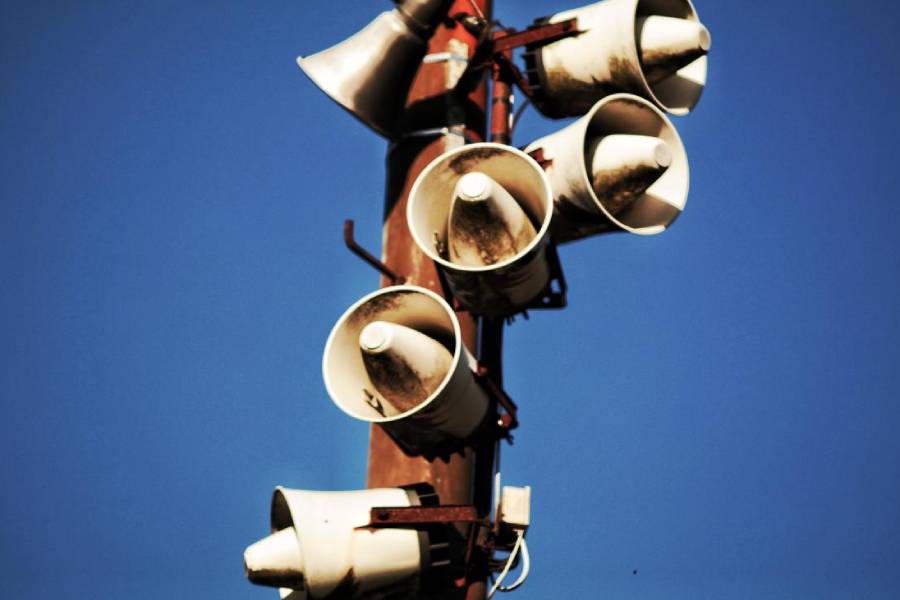Noisy celebration
Sir — While Durga Puja is undoubtedly the biggest celebration in the Bengali calendar, it is also responsible for contributing to tremendous amounts of noise pollution. Loud noise can severely affect patients, the elderly, children and animals. Last year, the West Bengal Pollution Control Board mandated all Puja committees to submit undertakings adopting anti-noise pollution measures and the police were asked to monitor the situation. But no such measure seems to be in place this year. Several Puja committees around Salt Lake have already started blaring songs near under-construction pandals. They care little for the inconvenience being caused to people. Political patronage allows these committees to get away with such unruliness.
Sneha Biswas, Calcutta
Big win
Sir — The resounding victory of the INDIA bloc in the first civic elections in Kargil since the suspension of Article 370 and the scrapping of Jammu and Kashmir’s special status is heartening (“INDIA 22, BJP 2 in Kargil polls”, Oct 9). The results will have a positive impact on the alliance’s image in the country.
Ananda Dulal Ghosh, Howrah
Sir — The results of the Ladakh Autonomous Hill Development Council elections will make it an uphill task for the Bharatiya Janata Party to retain the Lok Sabha seat of Ladakh in the upcoming general elections of 2024. The BJP was able to win in just two of the 26 constituencies that went to polls on October 4. The victory margin in the two constituencies was not significant either. The BJP should take stock of the situation.
Madhu S. Singh, New Delhi
Sir — Just months ago, the BJP commemorated the fourth anniversary of the controversial scrapping of Article 370. The results of the first civic polls held in Kargil after the revocation of Article 370 tells a different story. The INDIA bloc drubbed the BJP. This proves that BJP’s tactic of polarising the electorate will not bear fruit every time. On the other hand, the Congress leader, Rahul Gandhi, reached out to the people residing in the buffer zone between Leh and China and connected with the masses. His outreach clearly converted into votes. With the general elections approaching, the BJP should be wary.
Aayman Anwar Ali, Calcutta
Many shades
Sir — Unlike in the West where autumn is associated with melancholy, it is harvest season in the subcontinent (“Season of light & ache”, Oct 8). Uddalak Mukherjee should read Kalidasa, who has called autumn a maiden fair with nodding rice stems in her hair and lilies in her face. Does that description seem melancholic to Mukherjee?
Sanjib Ray Basunia, Bogura, Bangladesh
Sir — Autumn is called the season of melancholy. But it is more a time of solemn and serious thought. When the winds of autumn sigh around us, the lesson they teach us is that decay is the fate of all things in the world.
Tapesh Guha, Calcutta
Sir — Autumn is the most profitable season for farmers in Kashmir. The cool season is conducive to the cultivation of many types of crops. Throughout autumn, the mountains accumulate snow, which feeds glaciers and, in turn, provide water throughout the year to the Kashmir Valley. Apple and pear plucking is an important autumnal activity in Kashmir. People in remote areas start stocking up food for the harsh winter ahead. Many tourists visit Chinar Bagh and the Mughal Gardens and the tourism department begins preparing for various festivals till the end of winter. One hopes that peace will be restored in the Valley this autumn.
Owais Manzoor, Srinagar
Sir — Uddalak Mukherjee cited many poems in his article, “Season of light & ache”, but he missed “Sarat”, one of the most well-known poems by Rabindranath Tagore. The poet writes of the relation between ecstasy and pain in life.
Ganesh Sanyal, Nadia
Dubious course
Sir — It is strange that the Chhatrapati Shahu Ji Maharaj University, one of the biggest universities in Uttar Pradesh, has introduced courses on Karmkand and Jyotirvigyan, which have been described as part of the “Indian Knowledge Systems”. Both these courses pertain to religious beliefs and have little to do with logic or rationality. While premier institutions like the Indian Space Research Organisation and the Indian Institutes of Technology have brought us global recognition, such dubious courses will paint India in a poor light.
Avinash Godboley, Dewas, Madhya Pradesh
Annual menace
Sir — Dengue is an annual menace in West Bengal because of the state government’s refusal to take precautionary measures before the arrival of the monsoons (“Sting hidden”, Oct 9). Cleaning the city before the arrival of the monsoons and pre-empting the stagnation of water can prevent dengue deaths. The civic authorities should take proactive measures to prevent such outbreaks in the future.
Aranya Sanyal, Siliguri
Troubled minds
Sir — The theme of World Mental Health Day this year is ‘mental health is a universal human right’. A segment often overlooked when it comes to mental health is the informal worker. India’s informal workforce often operates without regulatory protection in unsafe working environments and endures long hours, not to mention the fact that it has little access to social or financial protections. These workers also face discrimination. All of this undermines the mental health of informal workers and limits their access to mental health care.
Khokan Das, Calcutta










